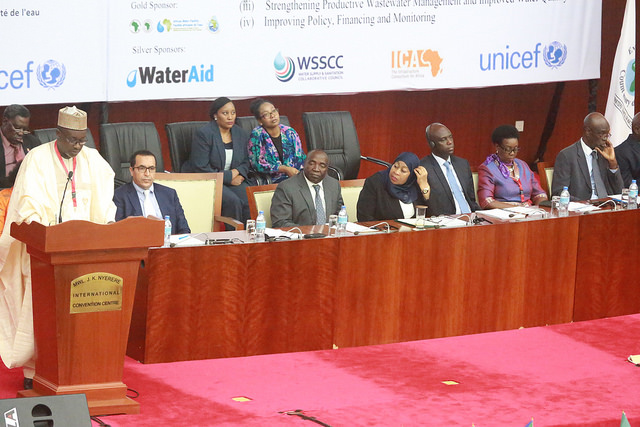
By Violet Mengo
African leaders and delegates at the ongoing 6th Africa Water Week have been urged to prioritise water if Africa is to achieve the sustainable development goals by 2030. Delivering the keynote address at the 10th General Assembly of the African Ministers’ Council on Water (AMCOW), Vice President of the United Republic of Tanzania, Her Excellency Samia Suluhu declared that without universal access to safe water and sanitation, poverty and inequality cannot be eradicated.
This was the passionate appeal made by Her Excellency Rhoda Peace Tumusiime, the Commissioner for Rural Economy and Agriculture at the African Union Commission (AUC) during the official opening of the 10th General Assembly on water in taking place in Dar es Salaam.
Tumusiime called on African leaders to put in place sound policies, legal and regulatory frameworks to support investments from various sources in water, sanitation and hygiene and also promote gender equality and women empowerment.
Recognising that a lot of effort has been put by African Ministers Council on Water (AMCOW) in addressing water challenges on the continent, Tumusiime underscored the need to also put in place adequate monitoring and evaluation systems to ensure proper tracking and reporting on Africa’s commitments.
She emphasized on the need for capacity building for the preparation of bankable projects, which would further help the continent to consolidate the gains of the past Millennium Development Goals (MDGs).
According to her, it is time for Africa to set the stage to establish baselines that would facilitate monitoring of progress to enable good reporting and further promote effective communication of the achievements on the SDGs Agenda 2030 and the aspirations of the Africa Agenda 2063 to the global community.
AMCOW executive secretary, Bai Mass Taal, told delegates that 2016 marks the organisation’s 14th year of existence and was particularly impressed that in these years of dynamism and purpose, AMCOW has actively pursued the goal of its founding fathers to serve a platform, to promote, security, social and economic development and poverty eradication among member states through effective management of the continent’s water resources and provision of water supply services.
AMCOW has continued to galvanise the global water community to positive actions on matters which are held dear to existence – “that we shall build an Africa where there is “an equitable and sustainable use and management of water resources for poverty alleviation, socio-economic development, regional cooperation, and the environment.”
Focusing on the theme of the 6th Africa Water Week, the general assembly carries the prospects of galvanising top-level commitments and decisions capable of setting Africa on the assured path of achieving water security and sanitation for all by 2030.
Earlier, Tanzanian Minister for Water and Irrigation Engineer Gerson Lwenge called on African governments to build and sustain cooperation among riparian countries in managing transboundary water resources.
“It is a fact that the more we invest in managing water resources, the more we strengthen AMCOW and the more we collectively advance towards achieving SDG number 6.” The sixth Africa Water Week which has been running alongside the General Assembly closes today.
Engineer Suleiman Adamu, chair of the Africa Water Facility (AWF) and Minister of Water Resources in Nigeria stated that the facility has admirably supported the ambitious goal of catalysing the development of Africa’s water sector to help the continent achieve water security, with a view of achieving the Africa Water Vision 2025. Most importantly, the AWF has emerged as project preparation leader in the African water sector.
“AWF bankable project preparation initiatives have contributed to attracting up to 1.6 billion euros for the implementation of follow up projects, of which two thirds of the funds have already been committed,” Adamu said. “Based on the available information, over 3.2 million people are expected to benefit from access to improved sanitation facilities and over 2.8 million people from access to improved drinking water sources.”
He said AWF is committed to promoting the sustainable development of the water sector to this end the facility ensures cross cutting issues such as climate change, environment protection, gender and social equity are properly addressed at every stage of the project cycle. As part of climate change strategy, AWF has priotised projects that feature water harvesting, conservation, storage, recycling and re-use and the use of renewable energy to power water stations and infrastructure. Adamu pointed out the inadequate funding the facility faces which he would soon reach critical point if African countries do not urgently give indication of their pledges as the financial needs by 2018 is estimated at 44 million euros.











